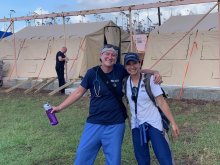
They had deployed with the International Medical Corps (IMC) to the island of Grand Bahama, where Hurricane Dorian destroyed homes and wiped out medical clinics and supplies.
Moore already was in position to help in Florida before Dorian struck the Bahamas. She was part of a four-person IMC team that arrived in Grand Bahama Sept. 8 to assess the outpatient clinic capacity in the eastern communities of Freeport, High Rock, Pelican Point, and McLean’s Town.
“These communities lost everything, and the pictures don’t do it justice.” -- UConn Health RN Amannda Ramsdell
“All of these outpatient clinics had been destroyed in the storm and no other medical providers had been out to assess these folks except for one very dedicated community physician who walked from Freeport all the way to High Rock as the roads were impassable,” Moore says. “We were the first medical team to reach Pelican Point and McLean.”
Soon, reinforcements arrived and started opening mobile medical units – clinics in popup tents – and canvassing neighborhoods. A centrally located semi-permanent clinic – two sturdy tents powered by a solar field donated by Tesla – would follow.

“To reach those individuals to let them know that the clinic was back opening and functioning, and to go out to those who didn’t have the ability to get to those clinics, we would take a nurse and then a doctor from public health in the Bahamas with us, to go door-to-door,” says Ramsdell, who arrived Sept. 11.
The more common problems were missing medications, minor wounds and injuries, and respiratory problems.
“We were doing a lot of tetanus shots, blood pressure checks, medication refills, and really screening for the tropical diseases that can spread rampant through a community at a time like this,” Ramsdell says. “A lot of people were wading in very unsanitary water. A lot of bacteria can grow and a lot of diseases can come about. We were giving out prophylactic antibiotics.”

Ramsdell, who was part of a relief mission responding to Hurricane Harvey last year, served as the lead for the mobile units. Moore, whose previous missions included Hurricanes Florence, Irene, and Juan and a refugee camp in Jordan, was the clinical team lead for the Dorian mission.
“We encountered a lot of people who had loved ones who were missing,” Moore says. “One man had lost his daughter, wife, grandson and mother-in-law in the storm. As we walked down the main street in High Rock, people noted that 17 people from that street alone were missing.”
They also encountered a man who, when his house was destroyed, sought refuge for a day and a half in a mango tree.
“These communities lost everything, and the pictures don’t do it justice,” Ramsdell says. “The degree of the devastation was huge. But what’s interesting is, the Bahamian people are very resilient, as if to say, ‘This is my town, this is my community, we are going to rebuild, and we’re doing to stay here and figure it out.’”

Ramsdell and Moore both joined an impromptu Sunday church service that took place in front of semi-permanent clinic Sept. 15, the day it opened.
“There were four different churches present, all different denominations,” Moore says. “They spoke about the loss but also how this community would stand together to face this and overcome it. The community bond and resilience was the most incredible thing I will remember.”
IMC plans to stay a total of three months to help rebuild the health care infrastructure, then turn the clinics and supplies over to the local providers.
“It’s overwhelming to come home and to look back on it, just to know that they’re going to be suffering for a long time,” Ramsdell says.
